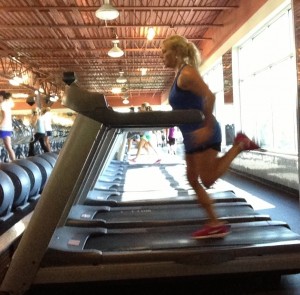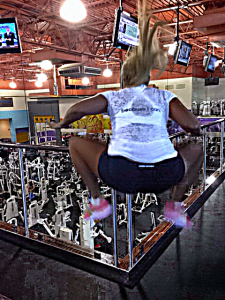- Should you eat before working out?
- Will you burn more fat on an empty stomach?
- Will you get ripped abs if you workout on an empty stomach?
 We’ve all heard it before, the theory or myth that doing cardio on an empty stomach after an overnight fast sends fat burning into overdrive. Is it true?
We’ve all heard it before, the theory or myth that doing cardio on an empty stomach after an overnight fast sends fat burning into overdrive. Is it true?
First of all, we can’t measure the amount of calories are body is burning during our workouts as our metabolism doesn’t work like it’s in a vacuum, for that moment. Rather, the body continually adjusts its use of fat and carbohydrate throughout the day for fuel depending on a variety of factors.
In general, if you burn more carbohydrates while exercising, you’ll ultimately burn more fat in the post-workout period and vice versa.
But realistically, it doesn’t make a bit of difference. You need to look at burning fat over the course of days, not hour to hour basis.
Some research does show that fasted cardio does burn more fat in low intensity cardio. And additionally, during moderate – high intensity levels, the body continues to break down significantly more fat when fasted compared to after you’ve eaten.
But according to Bodybuilding.com:
“Unfortunately, the rate of breakdown exceeds your body’s ability to use the extra fatty acids for fuel. In other words, you have a lot of extra fatty acids floating around in the blood that can’t be used by working muscles.
Ultimately, these fatty acids are repackaged into triglycerides post-workout, and then shuttled back into fat cells. So you’ve gone to excessive lengths…only to wind up at the same place.”
Seems like you should just perform low-intensity cardio on an empty stomach to burn those few extra fat calories. Weeelll, not really. Your training status also has an effect on the fasted cardio strategy.
If you exercise on a regular basis, the benefits of fasted cardio on fat utilization are negligible even at low levels of intensity. Studies have shown that when trained subjects exercised at 50 percent of their max heart rate, there was no difference in the amount of fat burned, regardless of whether the subjects had eaten.
 Fasted cardio makes even less sense when you take into account the impact of EPOC (excess post-exercise oxygen consumption)! EPOC, commonly referred to as the “afterburn,” represents the number of calories expended after training. Well guess what studies say? Eating before exercise promotes substantial increases in EPOC.
Fasted cardio makes even less sense when you take into account the impact of EPOC (excess post-exercise oxygen consumption)! EPOC, commonly referred to as the “afterburn,” represents the number of calories expended after training. Well guess what studies say? Eating before exercise promotes substantial increases in EPOC.
The majority of calories expended in the post-exercise period come, FAT! Then you also have to factor in the intensity factor. Everyone works and pushes differently.
Research indicates that high-intensity interval training is more effective than steady-state cardio for fat loss. Some people find it very hard to do a HIIT workout with an empty stomach, because they hit that proverbial wall.
In order to perform at a high level, your body needs a ready source of glycogen; (during HIIT that is what the muscles pull from to perform the exercise). When you deplete those stores and say goodbye to elevated training intensity. The result? Fewer calories are burned both during and after exercise, thereby diminishing total fat loss. Additionally, it has been shown that fasted cardio can also have a catablic effect on muscle. When you are in a glycogen depleted state, in can increase the amount of tissue proteins being burned for energy during the exercise. THAT is not our goal, to eat up precious muscle!
To sum it up, to each their own, right?
Some people can not workout with food in their belly’s as they “feel” they will get sick. Other’s hit a wall, and need something in their belly. Do what is best for your maximum performance. But additionally, “eating” prior to working out doesn’t mean you need to sit down and have a 300-500 calorie full breakfast. Something simple, about 100 calories is just fine. Performing cardio on an empty stomach is misguided to the masses. At best, the effects on body composition won’t be any better than if you trained in a fed state; at worst, you’ll lose muscle and reduce total fat loss. So if you should eat…what should you eat prior to cardio?
The answer depends on several factors, including the duration and intensity of training, the timing of previous meals before the cardio session, genetics and personal preference.
A good rule of thumb is to consume approximately 1/4 gram carbs and 1/8 gram of proteins per lb of your IDEAL bodyweight (which may not be your actual weight).
For example, if your ideal bodyweight is 200 pounds, then your pre-workout meal should consist of approximately 50 grams of carbs and 25 grams of protein. A protein shake of 25 grams protein and an apple may be all you need.
This is the age old chicken or the egg when it comes to losing body fat and leaning out. Continue to test different processes to find which works for your own body. Following some of the science behind this theory or process will surely help you have a starting point.

